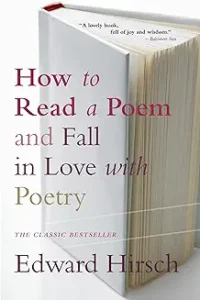How To Read A Poem and Fall in Love with Poetry by Edward Hirsch 1999
Hirsch is a superb poet (see the February update for some examples of his poetry) and one of the most productive literary critics writing about poetry today. This volume, written 25 years ago, is an in depth exploration of the literary form, analyzing its impact and how it achieves that impact. The book is long and quite dense, but after reading (and, yes, occasionally slogging) through its 350 pages, I feel a far greater capacity to approach poems, both those long familiar to me and those new.
Many otherwise avid readers, recoil from the thought of reading poetry. If you are among those, dip into Hirsch’s book. You’ll find insights into why this literary form is so powerful and read some beautiful examples that Hirsch uses to illustrate that power.
One of Hirsch’s central themes is the essential relationship between poet and reader, the ‘reciprocity, the strange interrelationship between the poet, the poem and the reader.” As he does throughout the text, he then provides examples of poets and their poems illustrating this point. In this case, Emily Dickinson, Walt Whitman, and Wallace Stevens. The latter’s poem ‘The House was Quiet and the World Was Calm’, concludes with this stanza: “And the world was calm. The truth in a calm world,/In which there is no other meaning, itself/Is calm, itself is summer and night, itself/Is the reader learning late and reading there.”
I feel inadequate to briefly summarize this book. It is filled with Hirsch’s own poetry in prose, metaphor after metaphor characterizing the special power and ability of poetry to ‘suspend normative time and arrest temporality’, its ability to stimulate ‘wonder’ in the reader, that ‘state of astonishment before the strangeness of the world.’
Many of my favorite poets appear throughout the book—Dickinson, Whitman, Frost, Stevens, Wordsworth, and especially Elizabeth Bishop whose poem “One Art” is worth the whole book’s reading. Interestingly, Hirsch calls upon Emerson as his go to authority on writing, poetry, the soul, and much else.
If you love poetry, definitely read this book. If you find it a bit off-putting, read the introduction and the first and final chapters. Either approach will expose you to Hirsch’s deep love and attachment to this method of coming to terms with your own questioning and wondering about why and what you are doing as this minute part of a minute planet in a gigantic universe that will someday disapper. Poetry is special.



